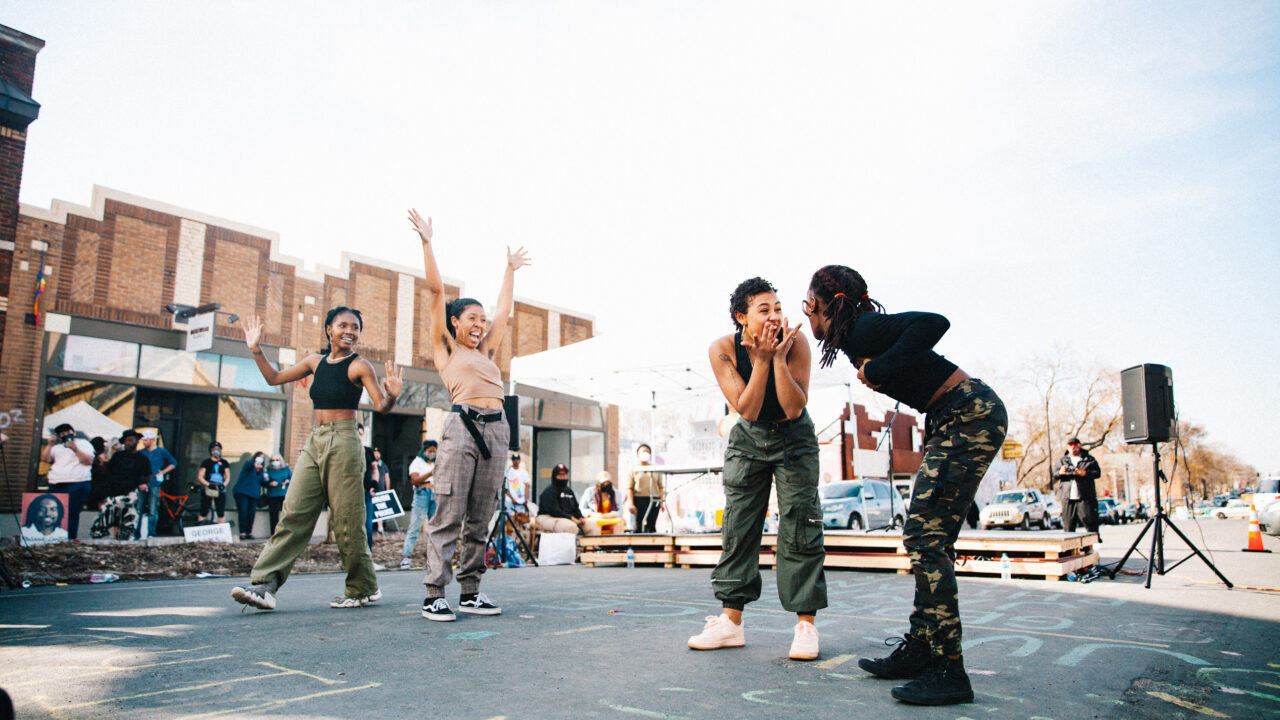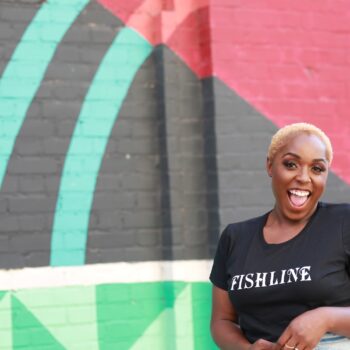Join me, dear reader, in a somatic practice. Start by noticing your breath and thinking about your own laughter. When was the last time you laughed? Where does laughter come from in your body (your chest, your throat, your belly)? How does it feel when you laugh? What does it sound like? Now think about the laughter of someone that you love. How does it sound? Do they laugh differently? How does it feel to be in the presence of their laughter, to hear it or to feel the vibrations of it? As you sit within those musings on laughter — your own and your loved one(s) — pay attention to the way that your body feels. Where does your joy live?
Let’s consider for a moment longer the question, “What does your laughter sound like?” My sister friend, Chandra, described my laughter as “like sunshine: bright, warm, and energetic. It brings people together and is what love and friendship stem from.” But throughout my life, people have described my laughter as loud, obnoxious, and rude. I received scoldings from teachers and poor marks on report cards because of my laughter and humor. They told me to shrink, to keep my laughter locked in my throat, to keep my joy bottled up inside of me. I grew ashamed of my laughter and joy — no longer seeing them as superpowers that could be used to connect with and heal myself and others.
I have had so much laughter stolen from me, as have so many Black people. It has taken me years to find my way back to laughter, back to those parts of myself. I now recognize my joy, laughter, and sacred silliness for what they are: freedom practices that are rooted in the legacies and histories of Black people, especially queer and trans people.
There are extensive histories of Black people utilizing humor to survive, re-imagine, connect, and heal. This history can be found in the lineage of celebrities and comedians like Whoopi Goldeberg, Cardi B, Richard Pryor, Keke Palmer, Miss Sophia, and Tabatha Brown. But this lineage is in no way limited to celebrities and comedians. It includes the “class clowns” (not bullies) who get kicked out of class, suspended, or expelled from school for making jokes in the face of curriculums, lesson plans, and entire school systems that have the audacity to minimize Blackness, queerness, Black history, and Black people. It includes the cousins exchanging hushed whispers and snickers at the front of the church during a funeral. It encompasses the friends who are always cracking jokes and causing everyone to fall out in hollering and laughter, and the stranger laughing at their phone while waiting at the bus stop during an evening commute. This is a lineage of sacred silliness as an embodied practice. One that white supremacy, patriarchy, and capitalism are designed to interrupt, criminalize, and erase. Every giggle, snort, belly laugh, and cackle disrupts these systems and feeds our collective visioning for a world where Black people can exist in the entirety of our emotions and experiences.
In order to truly love and support Black trans people, you must see us in our fullness — in moments of joy, sadness, silliness, happiness, grief, love, and struggle. We cannot only be seen when we are being harassed, abused, imprisoned, and murdered. Within movement spaces that are not specifically about/led by Black trans folks, we are frequently only centered in the context of transphobia, loss, and crisis. This framing does not allow Black trans people the expansiveness to show up whole — to be fully present with our wide smiles, generous laughs, and sacred silliness. If we are only discussed and invested in during moments of death and violence, then we are not being afforded the space to show up as whole, complex, multifaceted human beings throughout the course of our lives.
As I have begun to grow into my own fullness, I can embrace my sacred silliness and encourage others to do the same. I see sacred silliness as a freedom practice — one that moves us, individually and collectively, away from the notion that freedom is an external place where we will arrive once Black, queer, and trans people are no longer being murdered and we have succeeded in abolishing the police. Embracing sacred silliness as a freedom practice invites us to think of freedom as something that we can (and must) embody now — within our bodies, our interpersonal relationships, our organizations, direct actions, and moments of loneliness and grief — as we work to dismantle systemic oppression.
Developing my sacred silliness toolkit is a process that I imagine will require a commitment for the entirety of my life, but I know it is imperative for the world(s) that I am invested in building. I would like to offer three lessons I’ve learned by embracing sacred silliness as a freedom practice.
-
The gift of presence. Sacred silliness invites us to practice opening in numerous manifestations: openness to receiving the truths of others, openness to showing up fully in ourselves, presence with the mental and emotional well being of ourselves and others, and presence in connection. The gift of presence is the joy that happens after the blink that ends a staring contest or learning (and killing!) the choreography to a tik tok dance.
-
The extension of supernatural grace. My sacred silliness practice has required that I unlearn the ways that my joy has been demonized throughout my life and that I hold myself with grace throughout this unlearning and growing process. This looks like laughing through shame after you’ve fallen in front of a group of people.
-
The power of connection. This offering appears in all of the moments that we experience joy with others — moments when we share a funny story, joke, or meme, when we laugh as we reminisce on memories of a loved one lost. This practice involves leaning into all of the moments when we are reminded of how deep our connections run.
Think about the ways that you embody a sacred silliness practice of your own — the moments when you are present and reflective with yourself and with others; when you navigate learning and growing with accountability and grace; and when you connect with others in moments of joy, laughter, and silliness. These moments are generative and necessary; they aid us in navigating the world in alignment with our beliefs, politics, and visions for the future.
I recently hired and began on-boarding an executive assistant. Our partnership has already necessitated that I grow in my ability to both ask for and accept support, to delegate tasks, and to be honest about my own anxieties and insecurities. It has been a constant process of holding us both with grace and understanding as we navigate this new dynamic. So far, it has been a generative partnership and our conversations are often full of brainstorming, thought-provoking questions, and deep belly laughter that stretches across our faces through Zoom calls. Throughout their onboarding, we have begun a practice of starting each of our meetings with a song — anything ranging from Chaka Khan and Chloe x Halle to Luther Vandross and Tracy Chapman. This practice reminds us to check in with ourselves and helps bring us into our bodies, our minds, and our hearts so that we can be present for the work ahead.
As you sit with thoughts of abundant laughter, radiant Black joy, and sacred silliness, I invite you into a closing practice. If music is a source of energy, renewal, and grounding for you, as it is for me, this is an invitation to turn on a song that makes you light up from the inside out. One that brings a smile to your face and causes laughter to bubble up in your belly. If nothing comes to mind, some suggestions from myself and the SNaP Co. team are: On It, by Jazmine Sullivan; Sweet Thing, by Chaka Khan; Binz, by Solange; and Jump To It, by Aretha Franklin. Embodying joy and sacred silliness are freedom practices that bring us closer to the world(s) we are working toward every day.
The author, Toni-Michelle Williams, wrote this piece in collaboration with Abeo Chimeka-Tisdale (they/them).

